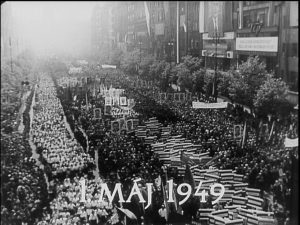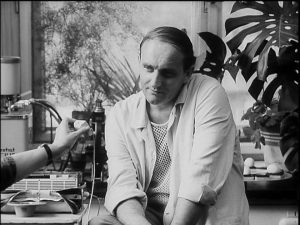In one of his pamphlets on the revolutions in nineteenth-century France, Karl Marx wrote that “The tradition of all dead generations weighs like a nightmare on the brains of the living.” He might have been talking about the jaded anti-hero of The Joke, Ludvik Jahn, who seems to be carrying the entire history of post-war Czechoslovakia under his middle-aged comb-over.
Jaromil Jires’ film opens with shots of the remarkable astronomical clock at Oloumouc, rebuilt in a style of socialist realism in the 1950s to feature peasants, workers, and soldiers. The clock includes a calendar highlighting the birthdays of Stalin and Klement Gottwald among others. It’s a first sign that this will be a film about time, the weight of the past, the fleeting present.
We meet Ludvik as he is returning to Oloumouc with the aim to seduce Helena, the wife of his old nemesis Pavel Zemánek… And off we go, moving backward and forward in time, but especially backward, to the high-spirited days of 1948-9 (the Communist consolidation of power), to the search for enemies of the early 1950s and Ludvik’s expulsion from the party and “reeducation.”
 This dark (and pessimistic) film was based on a novel by the great Czech author, Milan Kundera. We can talk a bit about him in class. It was in many ways a product of the Prague Spring, like the inquiry into the show trials of the 1950s that we are reading. But time marches forward. The film arrived in Czech and Slovak cinemas in February 1969 and was banned for the next twenty years…
This dark (and pessimistic) film was based on a novel by the great Czech author, Milan Kundera. We can talk a bit about him in class. It was in many ways a product of the Prague Spring, like the inquiry into the show trials of the 1950s that we are reading. But time marches forward. The film arrived in Czech and Slovak cinemas in February 1969 and was banned for the next twenty years…

